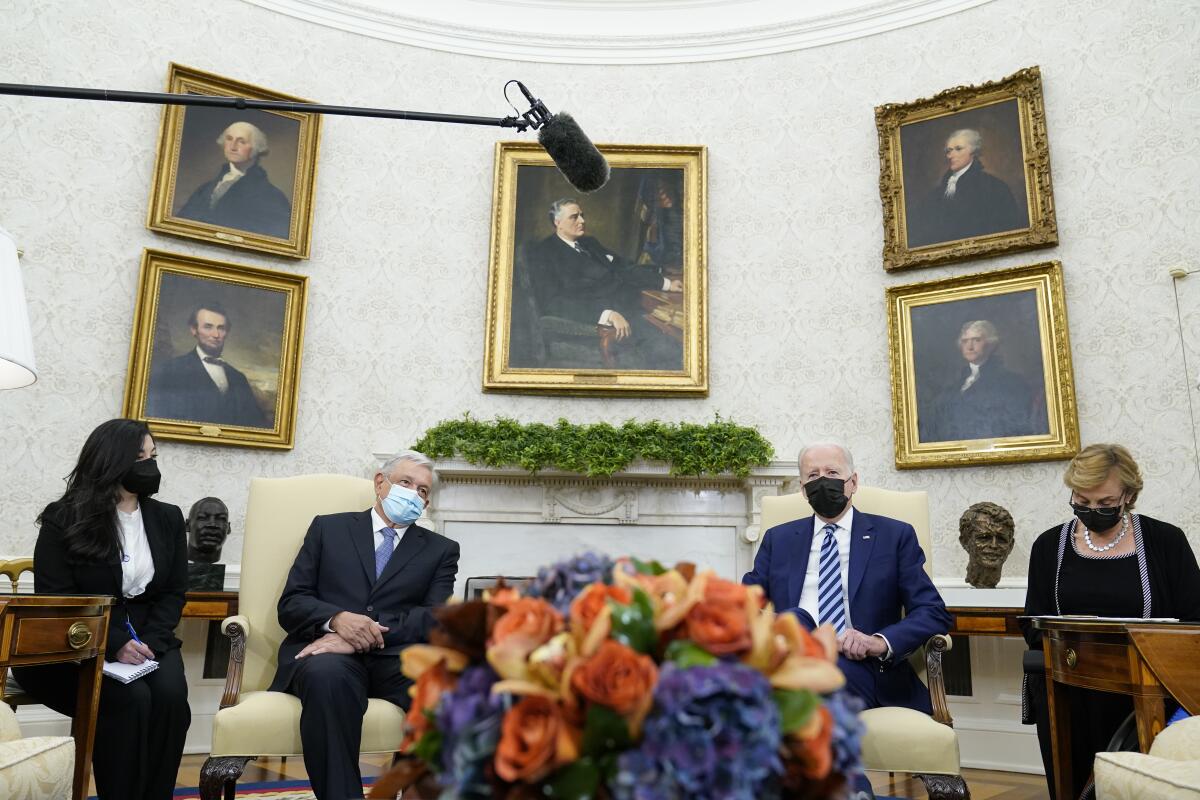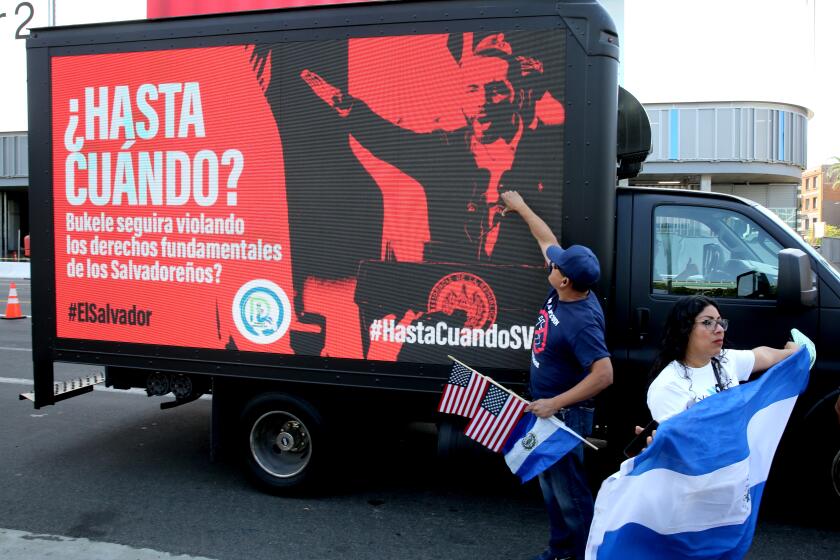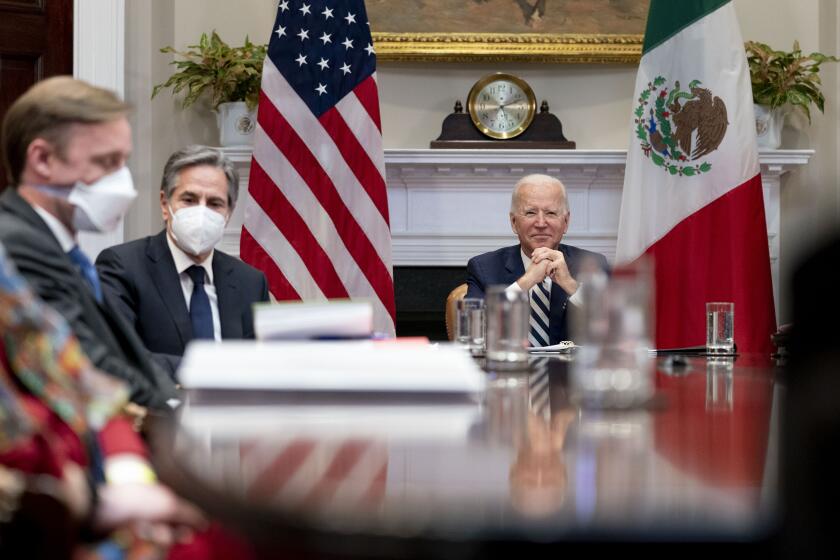After snubbing Biden at summit, Mexico’s president pokes him at the White House

WASHINGTON — A month after he boycotted a major regional summit in Los Angeles and snubbed the Biden administration, Mexico’s President Andrés Manuel López Obrador came to Washington on Tuesday for wide-ranging talks with his U.S. counterpart.
As usual, López Obrador did most of the talking. Following President Biden’s 10-minute opening speech in the Oval Office, the Mexican president engaged in a 31-minute soliloquy touching on the New Deal, gas prices and opportunities for greater economic collaboration.
Despite both leaders professing a desire to deepen the cooperation between their countries on trade, immigration and other issues, the interaction witnessed by reporters was highly performative and marked by a brotherly sort of one-upmanship.
Known for poking other world leaders, López Obrador urged Biden to follow the “bold” example set by former President Franklin D. Roosevelt, whose portrait hangs in the Oval Office and loomed over the shoulders of the two leaders as they spoke. Roosevelt, considered by historians to be among the most transformative U.S. presidents, steered the country through the Great Depression and World War II.
Outlining a plan for greater cooperation and trade, the Mexican president informed Biden that he was “allowing” Americans to cross the border to purchase gasoline in his country, noting that it’s currently a dollar cheaper per gallon — jabbing at the political wound that is arguably his host’s greatest domestic liability.
It was a familiar display to those who follow Mexico. Nearly every morning in Mexico, López Obrador delivers a long speech on television and then takes a handful of questions from reporters. The sessions last hours.
Biden, once López Obrador finished, reminded him that America’s economy is the fastest growing in the world, while showing no umbrage and restating his respect for Mexico and its leader.
“The thrust of what you’re saying, I agree with,” Biden said. “We need to work closer together.”
Hours after the meeting ended, both countries announced in a joint statement that Mexico had agreed to spend $1.5 billion on border infrastructure between 2022 and 2024 — allowing the White House to gloat on Twitter. “Trump in his four years couldn’t finish a border wall, let alone get Mexico to pay for it,” an administration official tweeted, celebrating the agreement.
The joint statement also indicated that the two countries would strive to reduce barriers to trade and that Mexico would also address food insecurity by purchasing 20,000 tons of milk powder from the U.S. to aid Mexican families in rural and urban areas, as well as 1 million tons of fertilizer to distribute to subsistence farmers.
Administration officials have sought to downplay the lingering tensions and U.S. frustrations ahead of talks between Biden and López Obrador that White House officials see as key to addressing immigration, crime and the economy. Biden himself did the same, dismissing any bitterness as a media fabrication.
“Despite the overhyped headlines that we sometimes see, you and I have a strong, productive relationship,” the U.S. president said, “and I would argue a partnership.”
López Obrador told Biden he wants to focus on inflation and how to cut it. Biden wants the Mexican government to continue to play an active role in stopping the arrival to the U.S. southern border of thousands of people, many seeking illegal entry.
López Obrador has been harshly critical of U.S. immigration policy and urged his U.S. counterpart on Tuesday to authorize more visas for Mexican workers and businesspeople, even as he acknowledged the political backlash Biden would face from Republicans.
“I say this in a sincere way and in the most respectful manner: It is indispensable for us to regularize and give certainty to migrants who for years have lived and worked in a very honest manner and are also contributing to the development of this great nation,” López Obrador said.
“I know your adversaries, the conservatives, are going to be screaming all over the place,” he went on. “But without a bold program … it will not be possible to solve problems. The way out is not through conservatism. The way out is through transformation. We have to be bold in our actions.”
Biden had already noted that his administration was “leading the way to creating work opportunities through legal pathways” and had approved a record number of H-2 work visas. He also announced that $3.4 trillion in funding from the infrastructure law passed last year would go to several projects to upgrade border stations.
López Obrador, a leftist populist prone to bombastic rhetoric, declined Biden’s invitation to attend the Summit of the Americas in Los Angeles in early June in protest over Washington’s refusal to include Cuba, Nicaragua and Venezuela on the guest list.
The summit’s opening day was overshadowed by an announcement from Mexican President Andrés Manuel López Obrador that he would not attend, along with complaints from experts that the event lacked focus.
The summit, which is held every three or four years, was in the U.S. for the first time in three decades, and the White House had billed it as a major event bringing the hemisphere’s leaders together for several days of talks and regional agreements. When López Obrador refused to attend, several other countries — including El Salvador, Honduras and Guatemala — sent lower-level delegations. Mexico was represented by its foreign minister.
The boycott of a summit that was supposed to delve into the same issues as those in the White House meeting has led some analysts to conclude that López Obrador isn’t as interested in Tuesday’s agenda as the message he hopes to send to the region.
“The most important reason AMLO is there is to show himself, and to show the world, that he is the unique and [true] regional leader of Latin America. He wants to be the older brother of Latin America,” said Viridiana Rios, an academic and writer who specializes in U.S.-Mexico relations, using the president’s nickname based on his initials.
For López Obrador, the stop in the Oval Office, along with a separate breakfast with Vice President Kamala Harris, is a “performance” that will confirm his power as the region’s leader, Rios said.
Harris was put in charge by the president of strategy for Central America that attacks the “root causes” of irregular immigration but has yet to show results.
López Obrador has also clashed with some U.S. leaders and numerous human rights organizations on other issues.
He routinely berates journalists at daily marathon news conferences and denounces Mexican anti-corruption and other groups that receive donations from outside Mexico.
He also refuses to reduce Mexico’s reliance on fossil fuels and is promoting an energy package that critics say favors state-run electricity companies over private firms. The U.S. says it’s likely a violation of the trade agreement that Mexico brokered with the U.S. and Canada.
Just the other day he condemned the U.S. extradition of Julian Assange, the founder of WikiLeaks, and said that if the U.S. imprisons him, the Statue of Liberty ought to be dismantled and returned to France.
“This is the first president since the 1980s who does not share a common vision with the U.S.,” said Luis Rubio, an economist at the Wilson Center’s Mexico Institute. “He is also at the stage of his presidency where everything is about his popularity. In this sense, Biden is no more than a cog in the pursuit of his objective.”
President Biden met by video Monday with Mexican President Andrés Manuel López Obrador, with the migrant crisis at the border topping the agenda.
Still, the Biden administration knows it needs cooperation from López Obrador and his government as it confronts an influx of migrants illegally crossing the southern U.S. border. Republicans have been pounding Biden over the issue, especially as the number of stops of migrants has risen.
For Biden, the goal is to gather allies, even when they don’t see eye to eye, as the world “realigns” in the wake of Russia’s war on Ukraine, said Andrew Selee, president of the Migration Policy Institute.
“Biden has made a decision that the world is now split into different camps and Ukraine is the axis around which this is dividing, and whether or not he has differences with López Obrador, that is less important than making sure he can manage that relationship,” Selee said.
“AMLO not going to the Summit of the Americas was a big blow to the relationship” between Washington and Mexico City, said Jason Marczak, senior director of the Adrienne Arsht Latin America Center at the Atlantic Council. “This [meeting] is incredibly important to reassure both Mexicans and Americans of the strength of U.S.-Mexico ties.”
More to Read
Get the L.A. Times Politics newsletter
Deeply reported insights into legislation, politics and policy from Sacramento, Washington and beyond. In your inbox three times per week.
You may occasionally receive promotional content from the Los Angeles Times.













